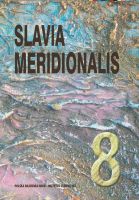Видови на културната меморија во македонскиот роман
Types of cultural memory in the context of the Macedonian novel
Author(s): Nataša AvramovskaSubject(s): Cultural Essay, Political Essay, Societal Essay
Published by: Instytut Slawistyki Polskiej Akademii Nauk
Summary/Abstract: The concept of cultural memory is necessarily contemplated in its relation to the type of a medium storing the information, in other words with the correlations of the oral, literary and electronic media codes. The study of the contemporary development of the Macedonian historical and meta¬ historical novel in the first part is made from the aspect of the participation of oral history (as a structure of memory) in the narrative structure of the historical novel (P. M. Andreevski: Beard Grass [Pirej]), and the pseudo-, i.e. meta-historical novel (S. Janevski, Kukulino; O. Nikolova: Ibn Pajko). At the same time, these three paradigmatic instances of the relation to the oral history of the Macedonian community illustrate also different stages of that development: modern vs. post-modern, as well as different concepts of the relation between an individual and the collective. The study also elaborates on the appearance of a new historic figure as literary characters in most recent Macedonian prose – namely (in order of their appearance in Macedonian literature): 1) the character of Alexander the Great or Macedonian, 2) the characters of converts (Islam-Christianity), 3) the figures of Macedonian Enlightment and “literature of facts” or “facts montage” and 4) the cultural icons.
Journal: Slavia Meridionalis
- Issue Year: 2008
- Issue No: 08
- Page Range: 81-96
- Page Count: 16
- Language: Macedonian

